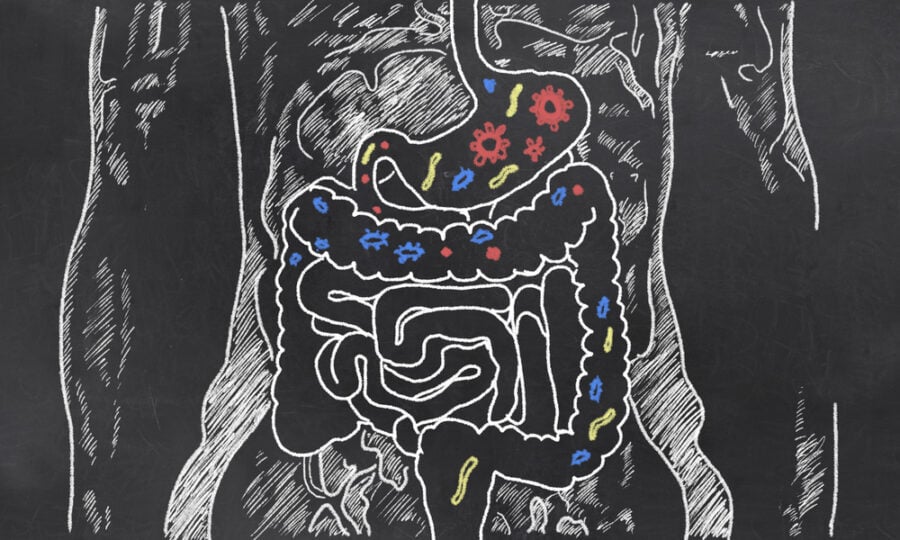Gut health issues are becoming more common, with symptoms including bloating, IBS, pain, reflux, and constipation. These affect many people and negatively impact their everyday lives.
Many contributing factors affect your gut health. These include diets, food intolerances, lifestyle, hormones, sleep patterns, stress, and especially medications, and all can impact body digestion and gut health.
To improve your digestion and overall gut health, I’ve gathered my top tips. The below information is based on research as well as my own personal experience with patients.
1- Test if you have any infections. You really need to resolve this before getting started.
2- Check if you have any food sensitivities and avoid them. Food sensitivities or intolerances can cause inflammations and damage to the lining of your digestive wall.
3- Eat plenty of fermented foods containing live microbes which are also foods high in natural probiotics (unsweetened nonconventional yogurt; kefir, which is a sour milk drink with five times as many microbes as yogurt; raw milk cheeses; sauerkraut; kimchi, a Korean dish made from garlic, cabbage, and chili; and GMO-free soybean-based products such as soy sauce, tempeh, and natto. Pickles are also a great choice if it is made with nonconventional ingredients and food additives)
4- Choose good quality probiotic supplements even though I still prefer natural food sources.
5- Stock up on dietary sources of prebiotics. Prebiotics are food for your microbiome! It’s important to feed these little guys to give them the energy they need to complete their very important task of managing your enteric nervous system. Here is a list of dietary prebiotics that should be staples in your home kitchen: whole grains, apples, leeks, onions, garlic, cocoa extracts, bananas, asparagus, nuts, root vegetables such as beetroots and sweet potatoes, and sprouted or soaked beans
6- Increase your intake of and pick high-fiber vegetables. Aim for more than 40g per day, which is about double the current averages. Great choices of high fiber foods are artichokes, leeks, onions, and garlic, which all contain high levels of inulin (a prebiotic fibre).
7- Try to incorporate bone broth into your daily routine. Bone broth is FULL of valuable amino acids, collagen, gelatine, and trace minerals. These are all fantastic for healing your gut.
8- Cut off on conventional sugars and processed food. Candida (yeast overgrowth) for example feeds on sugar and carbohydrates, so it makes sense that the average American diet fosters yeast overgrowth. Another reason found in one study: Mice-fed high-sugar diets lost gut microbial diversity and developed leakier guts: the tight junctions in their gut walls opened wider due to inflammation caused by high sugar intake.
9- Avoid unnecessary antibiotics and non-essential medicines. Even common medications like paracetamol and antacids can interfere with microbes.
10- Avoid food high in pesticides and additives. Eat seasonally and locally if possible. Food is more nutritious with less exposure to chemicals.
11- Don’t be hygiene obsessed. Fastidious washing and overuse of antibacterial sprays may not be good for your gut.
12- Spend more time in the countryside. People living in rural areas have better microbes than city-dwellers. Gardening and other outdoor activities are good for your microbiome.
13- Stroke/pet animals. Studies have shown that people living with pets have more microbial diversity.
14- Exercise is also a key that research has shown to help enhance greatly your gut microbiota. The microbiomes of physically active people are healthier and more diverse.
15- Reduce stress. Cortisol released by the adrenal glands in response to stressful situations lowers your immune system and increases your chances of yeast overgrowth. Control your stress through endeavor hobbies, say ‘no’ more often, and explore meditation, mindfulness, yoga, or Tai. Establishing balance in your life will support your mental and emotional health and optimizes your gut and overall health. Stress can negatively affect your microbiome and you need a healthy microbiome to manage help you manage your stressors.
16- And finally, get enough sleep! Getting enough rest is so important! Studies have shown that people with erratic sleeping patterns run the risk of disrupting their microbiome and running the risk of developing inflammatory diseases.
Remember that the choices you make today can alter your microbiome and health greatly by TOMORROW.








